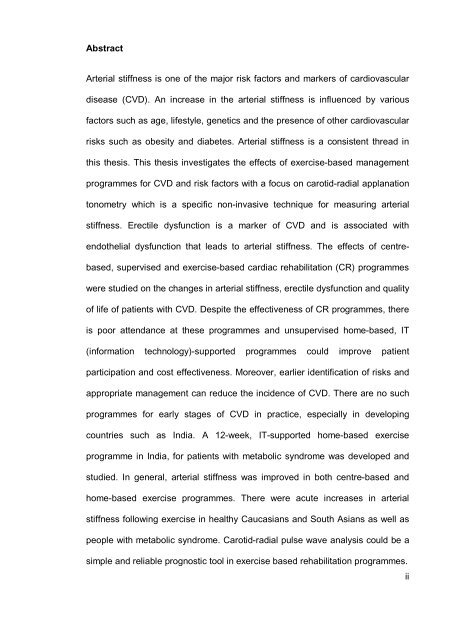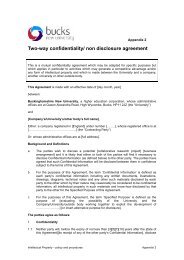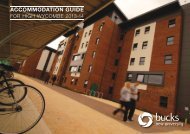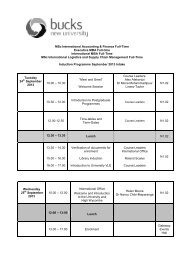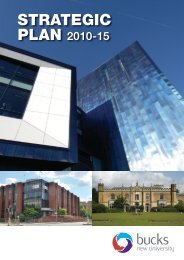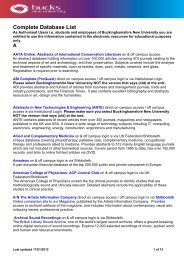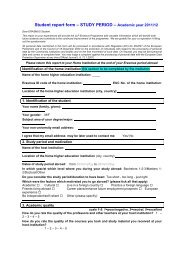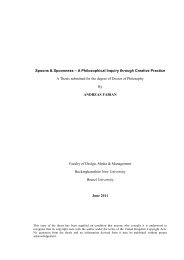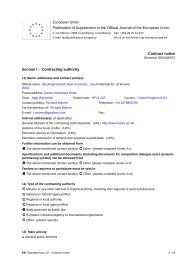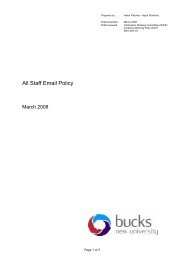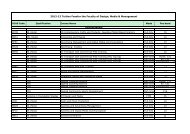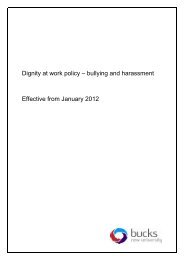- Page 1: CHANGES IN ARTERIAL STIFFNESS AND O
- Page 5 and 6: TABLE OF CONTENTSCHAPTER 1. INTRODU
- Page 7 and 8: 3.1. Introduction .................
- Page 9 and 10: 4.6. References ...................
- Page 11 and 12: 6.2. Cardiac Rehabilitation (CR) ..
- Page 13 and 14: 7.4.1. Pulse wave reflections .....
- Page 15 and 16: 8.4.2. Management of insulin resist
- Page 17 and 18: 10.1.1. Objectives ................
- Page 19 and 20: 11.2.4. IT support ................
- Page 21 and 22: LIST OF FIGURESFigure 1.1 The struc
- Page 23 and 24: LIST OF TABLESTable 2.1 Commerciall
- Page 25 and 26: Table 9.6 Chi-squared independence
- Page 27 and 28: SBPSystolic blood pressureSEVRSuben
- Page 29 and 30: differed from oxygen consumption un
- Page 31: 12345678910111213141516171819202122
- Page 34 and 35: To establish the changes in arteria
- Page 36 and 37: Arterial stiffness as a marker of c
- Page 38 and 39: Chapter Seven investigates the effe
- Page 40 and 41: Henry, R. M., Kostense, P. J., Spij
- Page 42 and 43: Triposkiadis, F., Kallikazaros, I.,
- Page 44 and 45: 2.1. Arterial mechanics2.1.1. Struc
- Page 46 and 47: Figure 2.3 Diagrammatic representat
- Page 48 and 49: Figure 2.5 Schematic representation
- Page 50 and 51: Metalloproteinases (MMP), collectiv
- Page 52 and 53:
2.2.3. Genetic relationsArterial st
- Page 54 and 55:
(Schimmler 1965; Avolio et al. 1983
- Page 56 and 57:
increasing age (Heffernan et al. 20
- Page 58 and 59:
2011). In more recent medicine, San
- Page 60 and 61:
appearance, it was also a simple mo
- Page 62 and 63:
adding a screw, the device was capa
- Page 64 and 65:
development of new hydraulic and el
- Page 66 and 67:
Budapest, Hungary). A list of commo
- Page 68 and 69:
Figure 2.16 The Complior- A piezo-e
- Page 70 and 71:
Khoshdel et al (2006) carried out a
- Page 72 and 73:
Figure 2.18 Structure of an arteria
- Page 74 and 75:
Figure 2.20 A sequence of pulse wav
- Page 76 and 77:
induces the release of nitric oxide
- Page 78 and 79:
2.5. ConclusionsVarious molecular,
- Page 80 and 81:
left ventricular load in a northern
- Page 82 and 83:
of primary coronary events in hyper
- Page 84 and 85:
Frank, O. (1926). "Die Theorie der
- Page 86 and 87:
Hope, S. A., Meredith, I. T., and C
- Page 88 and 89:
Kullo, I. J., and Malik, A. R. (200
- Page 90 and 91:
McNulty, M., Mahmud, A., and Feely,
- Page 92 and 93:
Nemes, A., Takacs, R., Gavaller, H.
- Page 94 and 95:
levels in essential hypertension."
- Page 96 and 97:
Sengstock, D. M., Vaitkevicius, P.
- Page 98 and 99:
glycation end products." The Journa
- Page 100 and 101:
Yan, S. D., Schmidt, A. M., Anderso
- Page 102 and 103:
3.1. IntroductionCentral aortic pre
- Page 104 and 105:
for arterial stiffness twice conseq
- Page 106 and 107:
‘suprasternal notch’ using a ta
- Page 108 and 109:
Table 3.1 Paired t-test results for
- Page 110 and 111:
Table 3.2 Intra class correlations
- Page 112 and 113:
data are centred and scaled using a
- Page 114 and 115:
hour-to-hour and week-to-week repro
- Page 116 and 117:
3.6. ReferencesAvest, E., Holewijn,
- Page 118 and 119:
Siebenhofer, A., Kemp, C., Sutton,
- Page 120 and 121:
4.1. Introduction4.1.1. Arterial st
- Page 122 and 123:
4.1.3. HypothesesH1- There will be
- Page 124 and 125:
continuous breath-by-breath measure
- Page 126 and 127:
exercise capacity variables and art
- Page 128 and 129:
Table 4.2 Difference in exercise va
- Page 130 and 131:
Table 4.4 Difference in exercise va
- Page 132 and 133:
Table 4.6 Difference in baseline ar
- Page 134 and 135:
Table 4.8 Changes in arterial stiff
- Page 136 and 137:
Figure 4.1 VO 2 peak vs. Augmentati
- Page 138 and 139:
4.4. DiscussionPulse wave analysis
- Page 140 and 141:
pressure and a decrease in SEVR aft
- Page 142 and 143:
participants would improve the powe
- Page 144 and 145:
4.6. ReferencesACSM. (2000). ACSM's
- Page 146 and 147:
M. (2009). "The accuracy of central
- Page 148 and 149:
Vaitkevicius, P. V., Fleg, J. L., E
- Page 150 and 151:
5.1. Introduction5.1.1. Obesity pre
- Page 152 and 153:
5.1.3. HypothesisIn young healthy I
- Page 154 and 155:
Site 4 Supra-iliac - A diagonal fol
- Page 156 and 157:
independent t test was used to find
- Page 158 and 159:
5.3.2. RelationshipsThe relationshi
- Page 160 and 161:
The participants who had higher phy
- Page 162 and 163:
compared with their body mass index
- Page 164 and 165:
Pulse wave velocity had significant
- Page 166 and 167:
quality of the results using this l
- Page 168 and 169:
de Jongh, R. T., Ijzerman, R. G., S
- Page 170 and 171:
Maffeis, C., Talamini, G., and Tato
- Page 172 and 173:
Wang, J., Thornton, J. C., Russell,
- Page 174 and 175:
6.1. Erectile dysfunctionErectile d
- Page 176 and 177:
enlargement of the penis and compre
- Page 178 and 179:
and listed the prevalence of ED. Th
- Page 180 and 181:
the patient had experienced an MI.
- Page 182 and 183:
6.1.5.2. Drug induced EDA medical t
- Page 184 and 185:
C-reactive protein (CRP) is a marke
- Page 186 and 187:
High risk:Unstable or refractory an
- Page 188 and 189:
elaxation and the inflow of arteria
- Page 190 and 191:
1998). A structured care for chroni
- Page 192 and 193:
These step changes include myocardi
- Page 194 and 195:
Negotiation of a written individual
- Page 196 and 197:
and primary health care teams take
- Page 198 and 199:
life improved in all the age groups
- Page 200 and 201:
Successful risk factor modification
- Page 202 and 203:
and consequent dissatisfaction is m
- Page 204 and 205:
(Turner et al. 2002). More research
- Page 206 and 207:
Blumentals, W. A., Gomez-Caminero,
- Page 208 and 209:
Jackson, G. (2006). "The second Pri
- Page 210 and 211:
Marchionni, N., Fattirolli, F., Fum
- Page 212 and 213:
Taylor, H. A., Jr. (1999). "Sexual
- Page 214 and 215:
7.1. Introduction7.1.1. Pathology o
- Page 216 and 217:
7.2.2. SubjectsThe study involved 1
- Page 218 and 219:
decreasing the number of undiagnose
- Page 220 and 221:
7.3. ResultsIn total, all the male
- Page 222 and 223:
PercentageModerate6%Complete18%Seve
- Page 224 and 225:
7.3.2. Medication for ED in CR7.3.2
- Page 226 and 227:
7.5 Correlations between erectitile
- Page 228 and 229:
CR. However, the recommendations fo
- Page 230 and 231:
2003; Enko et al. 2008). Peripheral
- Page 232 and 233:
7.4.2.1. International index of ere
- Page 234 and 235:
average cavernosal artery being 0.5
- Page 236 and 237:
according to their level of risks.
- Page 238 and 239:
7.6. ReferencesBarrett-Connor, E. (
- Page 240 and 241:
Mahmud, A., Hennessy, M., and Feely
- Page 242 and 243:
Wave Velocity as Index of Arterial
- Page 244 and 245:
8.1. Introduction8.1.1. Development
- Page 246 and 247:
The International Diabetes Federati
- Page 248 and 249:
8.1.2. Controversies among definiti
- Page 250 and 251:
Nutrition Survey, shows that 73.9%
- Page 252 and 253:
density lipoproteins (HDL), and vic
- Page 254 and 255:
8.2.7. Lifestyle8.2.7.1. DietDietar
- Page 256 and 257:
8.2.7.4. EducationEducation levels
- Page 258 and 259:
(NHANES III) found that 4% of USA a
- Page 260 and 261:
8.4. Management of metabolic syndro
- Page 262 and 263:
doses of statin are recommended to
- Page 264 and 265:
8.4.5.2. DietA lack of awareness of
- Page 266 and 267:
programmes, using recently develope
- Page 268 and 269:
Alberti, K. G., Zimmet, P., and Sha
- Page 270 and 271:
Bhatheja, R., and Bhatt, D. L. (200
- Page 272 and 273:
de Oliveira, E. P., de Souza, M. L.
- Page 274 and 275:
Fan, J. G., Zhu, J., Li, X. J., Che
- Page 276 and 277:
Grundy, S. M., Cleeman, J. I., Dani
- Page 278 and 279:
cause and cardiovascular mortality
- Page 280 and 281:
the incidence of metabolic syndrome
- Page 282 and 283:
Adult Treatment Panel III definitio
- Page 284 and 285:
Orchard, T. J., Becker, D. J., Bate
- Page 286 and 287:
Regitz-Zagrosek, V., Lehmkuhl, E.,
- Page 288 and 289:
Tillin, T., Forouhi, N., Johnston,
- Page 290 and 291:
CHAPTER 9. PREVALENCE OF HYPERTENSI
- Page 292 and 293:
the American Heart Association (Gru
- Page 294 and 295:
were used to screen the population.
- Page 296 and 297:
9.2.4. Quality controlThe result fr
- Page 298 and 299:
Table 9.1 Demographic and lifestyle
- Page 300 and 301:
Table 9.2 Chi-squared ‘goodness o
- Page 302 and 303:
Figure 9.2 Percentage of individual
- Page 304 and 305:
The univariate correlations between
- Page 306 and 307:
Table 9.7 Chi-squared significance
- Page 308 and 309:
physical activities were comparativ
- Page 310 and 311:
carbohydrate meal consumption is re
- Page 312 and 313:
countries such as Thailand (12%-18%
- Page 314 and 315:
and abdominal obesity with multiple
- Page 316 and 317:
Samal, D., Greisenegger, S., Auff,
- Page 318 and 319:
10.1. IntroductionMetabolic syndrom
- Page 320 and 321:
and sub-endocardial viability ratio
- Page 322 and 323:
able to pace themselves with the sp
- Page 324 and 325:
10.3.2. Total group changesThe chan
- Page 326 and 327:
Table 10.2 Changes in pulse wave an
- Page 328 and 329:
However, there were no significant
- Page 330 and 331:
Table 10.4 Comparison of arterial s
- Page 332 and 333:
10.3.5. RelationshipsIn general, th
- Page 334 and 335:
Table 10.7 Correlations between phy
- Page 336 and 337:
decrease after 20 weeks aerobic tra
- Page 338 and 339:
a Chinese population also had a sim
- Page 340 and 341:
10.4.4. LimitationsA larger number
- Page 342 and 343:
muscle contraction at comparable wo
- Page 344 and 345:
Oliver, J. J., and Webb, D. J. (200
- Page 346 and 347:
CHAPTER 11. EFFECTS OF AN IT-SUPPOR
- Page 348 and 349:
and diet are the major recommendati
- Page 350 and 351:
people’s lives. Use of text messa
- Page 352 and 353:
test. Participants were asked not t
- Page 354 and 355:
the internet using multi-messaging
- Page 356 and 357:
Table 11.1 Changes in arterial stif
- Page 358 and 359:
Table 11.2 Changes in health relate
- Page 360 and 361:
Table 11.3 Changes in blood glucose
- Page 362 and 363:
group-2 improved from 732 ±230.6m
- Page 364 and 365:
developed metabolic syndrome and le
- Page 366 and 367:
home-based exercise programme in pa
- Page 368 and 369:
significant improvement compared wi
- Page 370 and 371:
11.6. ReferencesAmerican Thoracic S
- Page 372 and 373:
systematic review and meta-analysis
- Page 374 and 375:
Maximisation study (BRUM): a random
- Page 376 and 377:
Oliver, J. J., and Webb, D. J. (200
- Page 378 and 379:
Thomas, R. J. (2007). "Cardiac reha
- Page 380 and 381:
CHAPTER 3: REPRODUCIBILITY OF ARTER
- Page 382 and 383:
CHAPTER 7: CHANGES IN ERECTILE DYSF
- Page 384 and 385:
CHAPTER 11: EFFECTS OF AN IT SUPPOR
- Page 386 and 387:
withdrawn and excluded from the the
- Page 388 and 389:
the prevalence is increasing global
- Page 390 and 391:
APPENDIX I. Bland- Altman plots sho
- Page 392 and 393:
Figure A.1.3 Bland - Altman limits
- Page 394 and 395:
Figure A.1.5. Bland - Altman limits
- Page 396 and 397:
Figure A.1.7 Bland - Altman limits
- Page 398 and 399:
Figure A.1.9 Bland - Altman limits
- Page 400 and 401:
Figure A.1.11 Bland - Altman limits
- Page 402 and 403:
Fig. A.2.2 VO 2 Peak vs. pulse wave
- Page 404 and 405:
Fig. A.2.4 VO 2 Peak vs. augmentati
- Page 406 and 407:
Fig. A.2.6 VO 2 Peak vs. augmentati
- Page 408 and 409:
Fig. A.2.8 VO 2 Peak vs. aortic aug
- Page 410 and 411:
Fig. A.2.10 VO 2 Peak vs. aortic pu
- Page 412 and 413:
Fig. A.2.12 VO 2 Peak vs. aortic sy
- Page 414 and 415:
Fig. A.2.14 VO2 Peak vs. aortic Dai
- Page 416 and 417:
Fig. A.2.16 VO2 Peak vs. mean press
- Page 418 and 419:
Fig. A.2.18 VO2 Peak vs. ejection d
- Page 420 and 421:
Fig. A.2.20 VO2 Peak vs. subendocar
- Page 422 and 423:
Fig. A.2.22 VO2 Peak vs. heart rate
- Page 424 and 425:
EGIR 8.9%Ko et al (2006)China, Hong
- Page 426 and 427:
Lee et al (2007)Son le et al (2005)
- Page 428 and 429:
Gentles et al (2007) New Zealand 35
- Page 430 and 431:
Dekker et al (2005) Netherlands 50-
- Page 432 and 433:
Goodpaster et al (2005)USA, Pittsbu


